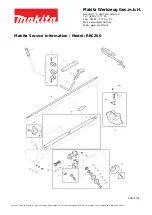
-4-
Rotary Hammer Safety Rules
a. Wear ear protectors.
Exposure to noise
can cause hearing loss.
b. Use auxiliary handle(s), if supplied with
t h e t o o l .
L o s s o f c o n t r o l c a n c a u s e
personal injury.
c. Hold power tools by insulated gripping
surfaces, when performing an operation
where the cutting tool may contact
h i d d e n w i r i n g .
C u t t i n g a c c e s s o r y
c o n t a c t i n g a " l i v e " w i r e m a y m a k e
exposed metal parts of the power tool
"live" and could give the operator an
electric shock.
d. Use clamps or another practical way to
secure and support the workpiece to a
stable platform.
Holding the work by
h a n d o r a g a i n s t y o u r b o d y l e a v e s i t
unstable and may lead to loss of control.
e. D o n o t d r i l l , f a s t e n o r b r e a k i n t o
e x i s t i n g w a l l s o r o t h e r b l i n d a r e a s
where electrical wiring may exist.
If this
situation is unavoidable, disconnect all
fuses or circuit breakers feeding this
worksite.
f. Use a metal detector to determine if
there are gas or water pipes hidden in
the work area or call the local utility
c o m p a n y
f o r
a s s i s t a n c e
b e f o r e
beginning the operation.
Striking or
c u t t i n g i n t o a g a s l i n e w i l l r e s u l t i n
explosion. Water entering an electrical
device may cause electrocution.
g. A l w a y s u s e t h e s i d e h a n d l e f o r
maximum control over torque reaction
or kick-back. Never attempt to operate
this tool with one hand.
The slip clutch
engages if you firmly control the tool
during a torque reaction or kickback.
h. A l w a y s w e a r s a f e t y g o g g l e s o r e y e
protection when using this tool. Use a
dust mask or respirator for applications
that generate dust.
Safety goggles or eye
protection will help deflect fragments of
the material that may be thrown toward
your face and eyes. Dust generated or
gases released from the material you are
cutting (i.e. asbestos insulated pipes,
radon) may cause respiratory difficulties.
i.
Use thick cushioned gloves and limit the
exposure time by taking frequent rest
periods.
Vibration caused by hammer-
drill action may be harmful to your hands
and arms.
j.
Position yourself to avoid being caught
between the tool or side handle and
walls or posts.
Should the bit become
b o u n d o r j a m m e d i n t h e w o r k , t h e
reaction torque of the tool could crush
your hand or leg.
k. Do not strike the bit with a handheld
hammer or sledgehammer to attempt to
d i s l o d g e a b o u n d o r j a m m e d b i t .
Fragments of metal from the bit could
dislodge and strike you or bystanders.
l.
Never place the tool down until the bit
or accessory has come to a complete
stop.
m. Do not use dull or damaged bits and
accessories.
Dull or damaged bits have a
g r e a t e r t e n d e n c y t o b i n d i n t h e
workpiece.
n. When removing the bit from the tool
avoid contact with skin and use proper
protective gloves when grasping the bit
or accessory.
Accessories may be hot
after prolonged use.
o. Do not run the tool while carrying it at
your side.
A spinning bit could become
entangled with clothing and injury may
result.
160992A5P0_GBH18V-45C 2/19/20 1:55 PM Page 4




































